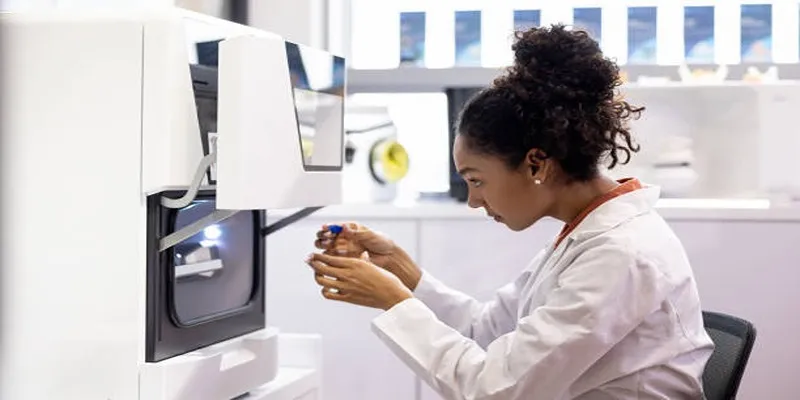The conventional methods of drug discovery and development are notoriously long and costly, often taking over a decade and billions of dollars to bring a new drug to market. However, generative AI is transforming the pharmaceutical industry by speeding up this process. It not only identifies potential drugs but also optimizes their formulation and predicts patient responses. This advancement in medicine could revolutionize healthcare by reducing trial costs and making treatments more accessible.

Generative AI and its Use in Drug Discovery
How Generative AI Accelerates Drug Development
Unlike traditional methods that rely on manual guesswork, AI models can analyze vast amounts of chemical and biological data in minutes. This not only accelerates the initial phase of chemical investigations but also allows researchers to explore virtual compounds before conducting real-world experiments. AI platforms like AlphaFold and IBM Watson are already helping pharmaceutical companies predict protein structures and molecular interactions. By leveraging molecular simulations and machine learning, the effectiveness of these processes is enhanced, increasing the success rate of clinical trials.
AI in Pharmaceutical Research: A Paradigm Shift
The use of AI technologies in the pharmaceutical industry has surged in recent years, optimizing the research process. Deep learning and neural networks are employed to perform text mining and analyze medical literature, clinical trial data, and genetic profiles to discover drug targets. AI can also repurpose existing drugs, saving time on developing new formulations. Companies like Insilico Medicine and BenevolentAI are using AI to rapidly scan billions of molecules. The benefits of this shift include reduced human intervention, cost savings, and increased accuracy in drug searches, ultimately improving patient outcomes globally.
Key Applications of AI in Pharmaceutical Research
Identifying Novel Drug Candidates Faster
A significant challenge in drug discovery is identifying new drug leads that are both effective and safe. Machine learning models enable the evaluation of biochemical interactions to determine how compounds will interact with the human body. This helps researchers identify better prospects and reduce failures in subsequent research phases. AI platforms like Atomwise and DeepMind’s AlphaFold are already employing these techniques.
Optimizing Drug Formulation and Safety
Beyond discovering new drugs, AI is improving drug formulation and safety. Machine learning algorithms can predict side effects, toxicity, and potential drug interactions before clinical trials. This reduces the likelihood of costly late-stage failures and enhances patient-centered care by tailoring drugs to individual genetic profiles, minimizing adverse effects.

Medical Innovation with AI: Transforming Clinical Trials
AI’s Role in Patient Selection and Monitoring
Clinical trials are one of the most time-consuming and expensive stages in drug development. AI is revolutionizing this process by improving patient selection through advanced data analysis. Candidates for trials are chosen based on genetic markers, medical history, and disease progression models, ensuring higher success rates.
Reducing Trial Costs and Timeframes
Traditional clinical trials can last several years and cost billions. AI alleviates these burdens by simplifying data processing and optimizing trial design. Automation reduces human errors and accelerates decision-making. Companies like BioXcel Therapeutics use AI to analyze trial outcomes and adjust parameters in real-time, eliminating the need for multiple trial phases. Simulation also allows researchers to predict trial results beforehand, enabling protocol adjustments.
Challenges and Ethical Considerations of AI-Driven Drug Discovery
Data Privacy and Bias in AI Models
Despite its effectiveness, AI in drug discovery faces challenges. Data protection is a major concern as AI relies on large datasets, including patient records and genetic information. Ensuring data security and compliance with regulations is crucial for building patient trust. Moreover, AI models can perpetuate biases present in their training data, potentially leading to unequal healthcare outcomes. Proper regulation is necessary to prevent advantages for certain groups while discriminating against others.
Future Prospects
Advancements in AI research are expected to enable precision medicine, offering treatments tailored to individual genetic profiles. This potential has led to partnerships between major pharmaceutical players and AI startups. AI could also play a significant role in identifying treatments for rare and complex diseases currently without cures.
Conclusion
Generative AI is transforming the pharmaceutical field by accelerating research and making it more cost-effective and accurate. AI helps scientists identify promising drug candidates, optimize their formulation, and streamline clinical trials, significantly speeding up the process from lab to market. Despite challenges like data privacy and bias, the benefits of using AI in drug development are substantial. The continued integration of AI in medicine promises to advance treatment solutions and improve patient health worldwide, solidifying AI’s role in the future of pharmaceuticals.
 zfn9
zfn9






















